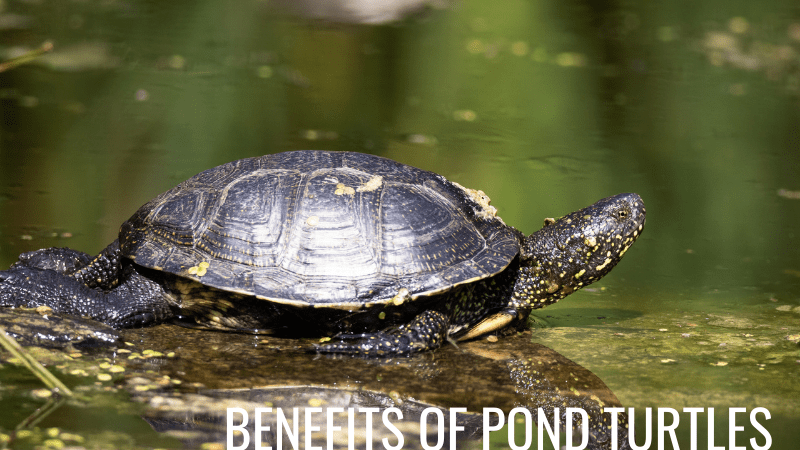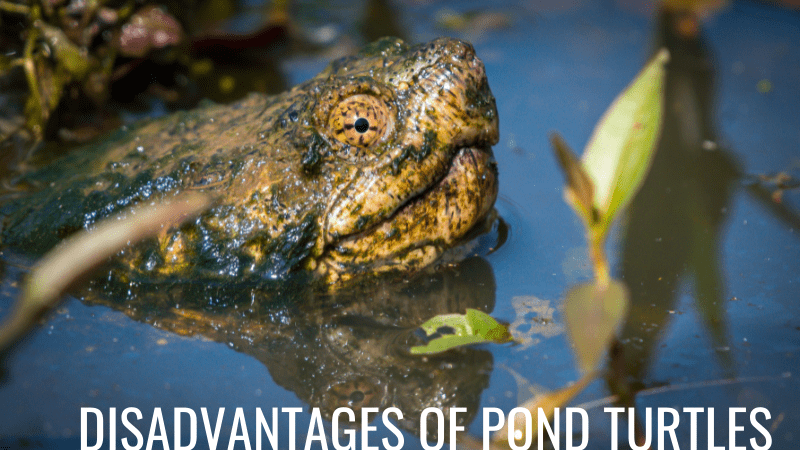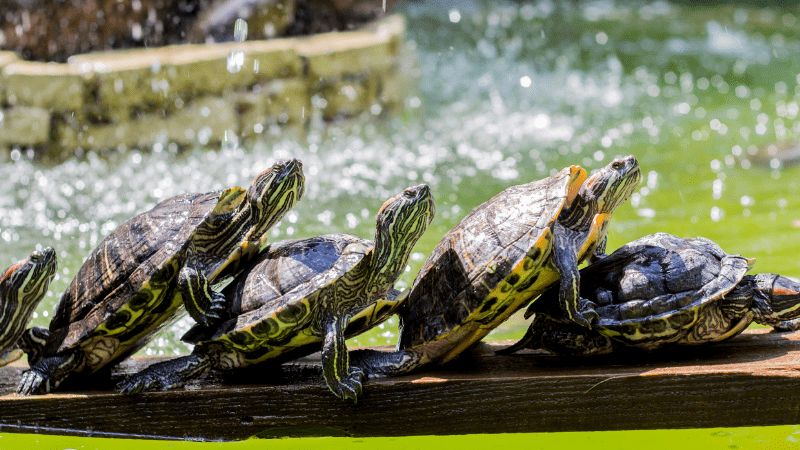Turtles in a Pond: Good or Bad? (The Facts)
Turtles are a fascinating and fun species to watch, but is there any benefit to having them in your pond?
Or, more importantly, are turtles bad for your pond?
Let's take a look at the pros and cons of having these creatures as a part of your backyard pond ecosystem. Plus, whether you should have them in your pond or not.
Are Turtles Good For a Pond?

A few turtles in your pond, especially sliders, are actually good for the pond's ecosystem as they help keep it clean while having a minimal effect on your pond biologically.
Let's take a closer look at the benefits of having turtles in a pond.
- Turtles are omnivorous creatures, eating plant matter as well as sick and deceased fish. This helps to keep your pond clean and reduce the risk of infections from rotting flesh. Even snapping turtles, which are considered predators, will typically eat sick or dead fish over live ones. This is mainly because turtles, in general, are no match for a fish's speed and agility in the water.
- Turtles can help with aquatic weed control, as well, as they love to eat certain types of problematic weeds in ponds.
- Turtles, in moderation, have a very minimal impact biologically on your pond. While they may compete with your fish for food (insects, plants, etc.), there's no evidence that a moderate amount of turtles will starve your fish.
- Turtles are fun to watch and make a unique addition to your pond!
Get Our Best Pond Tips Sent to Your Inbox for Free!
Join thousands of others and learn from our decades of pond building and maintenance experience! Your pond will thank you!
By subscribing you agree to receive emails from PondAcademy.com. We will always respect your privacy and you can unsubscribe at any time.
Are Turtles Bad For a Pond?

While turtles have their benefits, they can become a nuisance when they overpopulate your pond or lake. Some turtles can even be dangerous for a variety of reasons.
Let's now look closer at why turtles can be bad for ponds.
- The biggest disadvantage to having turtles in your pond is they can reproduce quickly. If left unchecked, they can overpopulate a small pond in a short amount of time, leading to water quality issues, competing with other pond life for resources, etc.
- While turtles typically prey on dead or weakened fish in your pond, there is the chance that they will eat healthy fish. This may not be a big deal in a stocked farm pond, but you probably don't want to risk it for fisheries or ponds with ornamental koi.
- The same goes for aquatic plants. While it's great that they can help control aquatic weeds, as mentioned above, they don't differentiate between nuisance plants and the ones you want to grow in your pond.
- If you have a recreational pond, it is not safe to swim in a pond with snapping turtles in it. The snapping turtle can grow quite large and have a powerful jaw with sharp claws on its feet. And, unfortunately, they can be aggressive, causing serious injury to those in and out of the water, especially during the egg-laying months of June-July.
- Turtles also carry salmonella bacteria, which can be transmitted to humans. In fact, the risk of disease is so high that it can be illegal to sell certain turtles in the US. If you have stomach issues, fever, and/or diarrhea after coming into contact with a turtle, seek medical attention immediately.
- Trapping and relocating turtles you don't want in your pond can be difficult. Plus, you may need a permit to relocate certain types of pond turtles in the wild as they can be considered an invasive species and out-compete native species of turtles for food.
![]() Tip
Tip
Are turtles becoming an issue in your pond? Check out our guide on how to get rid of turtles in a pond for some safe and effective pest control methods.
Should I Put Turtles in My Pond?

Turtles can make a great addition to your pond as they can help keep it clean, have a minimal biological impact, and are a fun and unique addition. But, you need to weigh the disadvantages, as well.
Adding a few slider turtles, for example, painted turtles or red-eared turtles, will have some benefits, and they should have little to no negative impact on your pond's ecosystem. They may eat some of your prized plants if you have any, but that's about it.
Related: What Do Pond Turtles Eat?
Snappers, like the common snapping turtle, are cool creatures, but if you have ornamental fish or kids playing in or near your pond, you might want to refrain from adding them.
Ultimately, you, the pond owner, need to weigh the advantages and disadvantages of having these shelled reptiles and decide if they are right for you and your pond. If you do decide to add pet turtles to your pond, be sure to check out our guide on how to keep turtles in a pond for some important information and tips.




